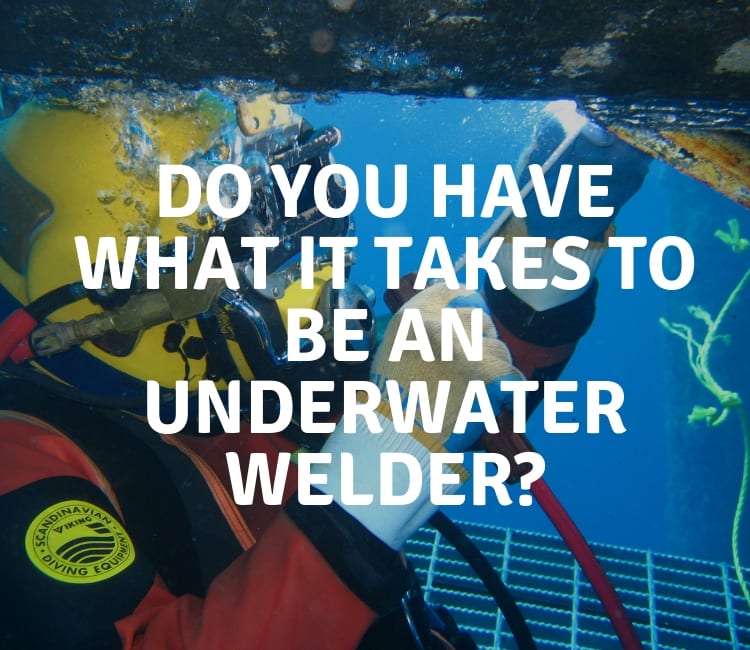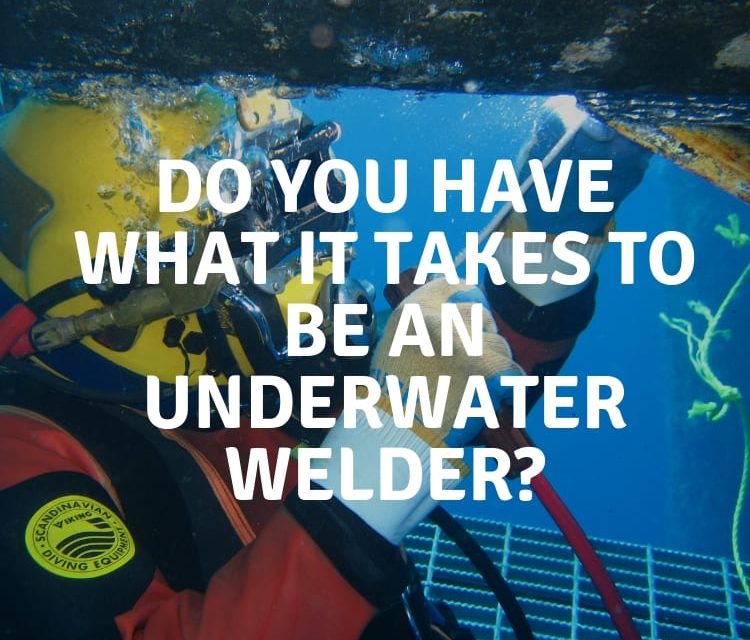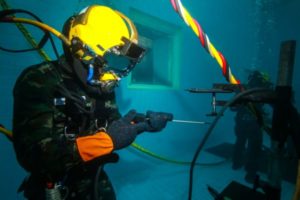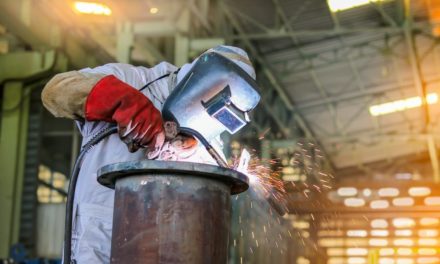Underwater welding can be an exciting career, taking you to many parts of the world. Of course it can be a dangerous occupation as well. While the pay is similar to that of pipeline welders, the top welders in the field can make well over 6 figures. Read more to learn what it takes to become an underwater welder.
Just getting started in welding? This article explains how getting your certification can jump-start your career!

Within this category of welding, there are two further subcategories; welding that’s carried out in a wet environment while the other is completed in an enclosure with positive pressure, making it a dry environment. Instead of referring to them as wet and dry methods, underwater welders have begun to call it underwater welding, and hyperbaric welding respectively.
Want to find the best welding schools? Just fill out the form below!
This entire method of welding, as a whole is practiced for reasons such as repairing ship bodies and pipelines that are set up underwater. The metal in question that’s most commonly welded is robust, high-quality steel that can handle the conditions in high-pressure environments.
Hyperbaric welding, which is performed in a dry environment, is preferred over the wet kind because it is practiced in a controlled setting where numerous other aspects can be leveraged as well. Not to mention that as a result, a stronger and long-lasting weld is created as a result.
Are you interested in becoming an underwater welder yourself? It sounds like an interesting task and is highly demanded because of its complex job description that requires you to know about various welding techniques and be an expert diver. However, that’s just a gist of the actual job description of an underwater welder; there’s actually much more to it.
Click here for “10 Interesting Facts about Underwater Welding.”
Underwater Welder Job Description
Another name for the career ‘underwater welder’ is an offshore welder and refers to their job of making repairs at offshore oil platforms. They need to be able to handle specialized welding equipment while completing the task in a risky environment.
Personal Skills
For starters, they’ll need to know how to initiate different procedures and work with different kinds of tools. Also, it’s not just welding that they’ll be doing but other duties such as inspection and analysis, drafting, cutting, testing, and photography. All of this will be related to the project that they’ll be taking up on a day to day basis.
Underwater welding projects are never completed by a single person alone, and a whole group is assigned. This factor makes it highly crucial that aspiring underwater welders have excellent interpersonal, as well as communication skills. This contributes to the overall efficiency of a group.
Academic Record and Other Educational Prerequisites
Moving on, an aspiring underwater diver should be able to display exceptional diving skills, but a commercial diving certification is also required so that employers can know that the applicant’s skills have been tested.
These certificates are offered by various institutions but it’s crucial that an applicant be able to incorporate the factors of using advanced welding equipment at the same time as being underwater. This aspect is something that employers can’t compromise on, no matter how well an applicant knows and performs when it comes to diving and welding separately.
Being fully qualified requires that an applicant has been well-prepared by his welding school, to handle specific tools, carry out inspection tasks and hyperbaric chamber missions. Also, they must have proper training in diver communication and physiology, as well as emergency safety techniques.
Welding practices that are defined under the AWS D3.6 are considered to be standard underwater welding tasks. There are numerous welding schools that have similar courses where you can learn the same things. These courses are generally accepted by the American Welding Society, and this determining factor ensures that aspiring underwater welders will find their desired courses at many institutions.
To receive more information from welding schools offering underwater training, simply complete the form on the right side of this page.
Although there is no age cap on for applicants who want the job, it is mandatory that they do have excellent health records and are in good shape. This is measured objectively by whether the applicant concerned suffers from conditions or health issues such as cardiovascular disease or diabetes.
Other Practice Traits
Whichever corporation that one applies to, it’s likely that they will test applicant’s skills to know whether they can prove to be an asset to their company. Here are some of the traits that one should put into practice because they’re what large corporations look for.
- Precision: This goes without saying because it’s essential that an underwater welder be skilled enough to display precision while making a weld. Otherwise, they may commit an error due to pressure and risk jeopardizing the entire project.
- In-Depth Analysis: While underwater, there isn’t much time for a welder to be rethinking. At that point, the only thing important is to act and get the job done. But before the task, they will be tested for the critical thinking skills that allow them to analyze the task at hand from different perspectives. Welders will have to inspect the job site, the equipment, and predict the approximate depth at which the process will take place.
- Prioritize Each Aspect: Although it may seem, that in a situation such as that of underwater welding, everything takes precedence, this isn’t the case. There are certain aspects of the job which are considered secondary with respect to other factors. For instance, it isn’t the main priority for an underwater welder to keep the surface welding equipment in proper condition, or retain the effectiveness of the waterproof connecting leads that attach the welder’s tools to the machine on the surface.
- Have a Steady Hand: Due to the nature of the tasks involved in underwater welding, it can be hard to maintain composure in such situations. That’s why welders are advised to have enough practice that they have a steady hand, even underwater. This is as crucial as precision because lack of composure can lead to poor results.
These are all the education requirements, personal capabilities, and traits that companies look for when hiring an underwater welder. It may seem impossible for a single person to possess all these aspects, but it can be done through practice. Have a look at the list again; do you think you have what it takes to become an underwater welder?



